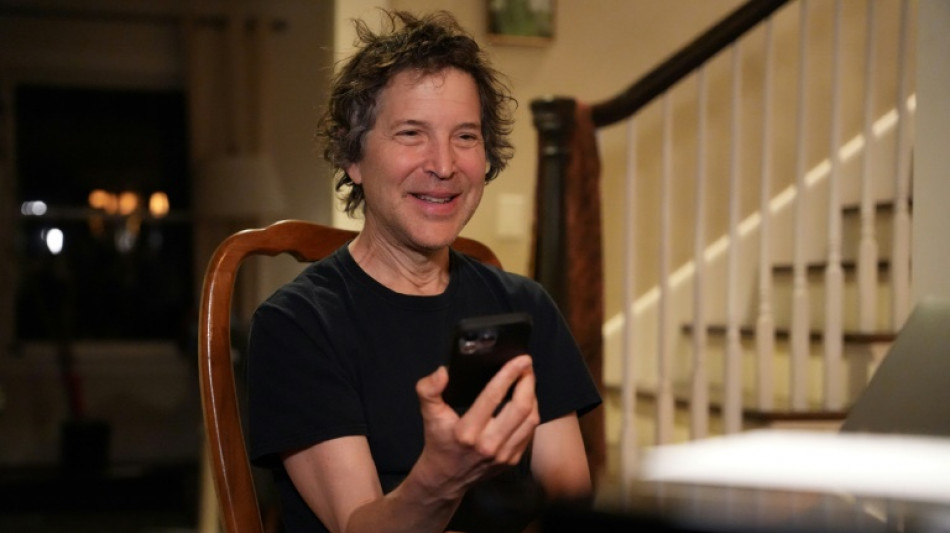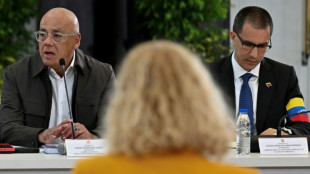
-
 Dupont wants more after France sparkle and then wobble against Ireland
Dupont wants more after France sparkle and then wobble against Ireland
-
Cuba says willing to talk to US, 'without pressure'

-
 NFL names 49ers to face Rams in Aussie regular-season debut
NFL names 49ers to face Rams in Aussie regular-season debut
-
Bielle-Biarrey sparkles as rampant France beat Ireland in Six Nations

-
 Flame arrives in Milan for Winter Olympics ceremony
Flame arrives in Milan for Winter Olympics ceremony
-
Olympic big air champion Su survives scare

-
 89 kidnapped Nigerian Christians released
89 kidnapped Nigerian Christians released
-
Cuba willing to talk to US, 'without pressure'

-
 Famine spreading in Sudan's Darfur, UN-backed experts warn
Famine spreading in Sudan's Darfur, UN-backed experts warn
-
2026 Winter Olympics flame arrives in Milan

-
 Congo-Brazzaville's veteran president declares re-election run
Congo-Brazzaville's veteran president declares re-election run
-
Olympic snowboard star Chloe Kim proud to represent 'diverse' USA

-
 Iran filmmaker Panahi fears Iranians' interests will be 'sacrificed' in US talks
Iran filmmaker Panahi fears Iranians' interests will be 'sacrificed' in US talks
-
Leicester at risk of relegation after six-point deduction

-
 Deadly storm sparks floods in Spain, raises calls to postpone Portugal vote
Deadly storm sparks floods in Spain, raises calls to postpone Portugal vote
-
Trump urges new nuclear treaty after Russia agreement ends

-
 'Burned in their houses': Nigerians recount horror of massacre
'Burned in their houses': Nigerians recount horror of massacre
-
Carney scraps Canada EV sales mandate, affirms auto sector's future is electric

-
 Emotional reunions, dashed hopes as Ukraine soldiers released
Emotional reunions, dashed hopes as Ukraine soldiers released
-
Bad Bunny promises to bring Puerto Rican culture to Super Bowl

-
 Venezuela amnesty bill excludes gross rights abuses under Chavez, Maduro
Venezuela amnesty bill excludes gross rights abuses under Chavez, Maduro
-
Lower pollution during Covid boosted methane: study

-
 Doping chiefs vow to look into Olympic ski jumping 'penis injection' claims
Doping chiefs vow to look into Olympic ski jumping 'penis injection' claims
-
England's Feyi-Waboso in injury scare ahead of Six Nations opener

-
 EU defends Spain after Telegram founder criticism
EU defends Spain after Telegram founder criticism
-
Novo Nordisk vows legal action to protect Wegovy pill

-
 Swiss rivalry is fun -- until Games start, says Odermatt
Swiss rivalry is fun -- until Games start, says Odermatt
-
Canadian snowboarder McMorris eyes slopestyle after crash at Olympics

-
 Deadly storm sparks floods in Spain, disrupts Portugal vote
Deadly storm sparks floods in Spain, disrupts Portugal vote
-
Ukrainian flag bearer proud to show his country is still standing

-
 Carney scraps Canada EV sales mandate
Carney scraps Canada EV sales mandate
-
Morocco says evacuated 140,000 people due to severe weather

-
 Spurs boss Frank says Romero outburst 'dealt with internally'
Spurs boss Frank says Romero outburst 'dealt with internally'
-
Giannis suitors make deals as NBA trade deadline nears

-
 Carrick stresses significance of Munich air disaster to Man Utd history
Carrick stresses significance of Munich air disaster to Man Utd history
-
Record January window for transfers despite drop in spending

-
 'Burned inside their houses': Nigerians recount horror of massacre
'Burned inside their houses': Nigerians recount horror of massacre
-
Iran, US prepare for Oman talks after deadly protest crackdown

-
 Winter Olympics opening ceremony nears as virus disrupts ice hockey
Winter Olympics opening ceremony nears as virus disrupts ice hockey
-
Mining giant Rio Tinto abandons Glencore merger bid

-
 Davos forum opens probe into CEO Brende's Epstein links
Davos forum opens probe into CEO Brende's Epstein links
-
ECB warns of stronger euro impact, holds rates

-
 Famine spreading in Sudan's Darfur, warn UN-backed experts
Famine spreading in Sudan's Darfur, warn UN-backed experts
-
Lights back on in eastern Cuba after widespread blackout

-
 Russia, US agree to resume military contacts at Ukraine talks
Russia, US agree to resume military contacts at Ukraine talks
-
Greece aims to cut queues at ancient sites with new portal

-
 No time frame to get Palmer in 'perfect' shape - Rosenior
No time frame to get Palmer in 'perfect' shape - Rosenior
-
Stocks fall as tech valuation fears stoke volatility

-
 US Olympic body backs LA28 leadership amid Wasserman scandal
US Olympic body backs LA28 leadership amid Wasserman scandal
-
Gnabry extends Bayern Munich deal until 2028


Nobel chemistry winner sees engineered proteins solving tough problems
Whether it's battling tumors or breaking down plastic, American scientist David Baker, co-recipient of this year's Nobel Prize in Chemistry, has an answer: engineering proteins that don't naturally exist -- a concept once dismissed as "crazy."
Today, proteins with novel functions are flowing steadily out of his lab, with an endless list of potential applications ranging from ultra-targeted therapies to the development of new vaccines.
"Across the range of problems that we face today in medicine and health, sustainability, energy, and technology, I think the potential for protein design is enormous," Baker told AFP via video call from Seattle, hours after learning of his Nobel win alongside two other laureates.
Proteins are organic molecules that play a fundamental role in almost every function of living organisms, from muscle contraction and food digestion to neuron activation and more.
"The ones in nature evolved to solve all the problems that were faced during natural selection," explained the 62-year-old University of Washington professor.
"But humans face new problems today," added the biochemist and computational biologist.
"We're heating up the planet, so we need new solutions in ecology and sustainability. We live longer, so there's new diseases which are relevant, like Alzheimer's disease. There's new pathogens like coronavirus."
Rather than leave these problems up to evolution -- a "brutal" solution that would take a very, very long time -- "with new proteins, we can solve those problems, but in a very short time," he said.
- From fringe to mainstream -
All proteins are composed of chains of amino acids, whose sequence dictates their shape -- and ultimately their function.
For decades, scientists have tried to determine protein structures based on these amino acid sequences.
In the late 1990s, Baker made strides towards solving this problem with a computer software he developed called Rosetta.
His success prompted a shift his focus to the reverse approach: starting with a desired shape and using Rosetta to identify the corresponding amino acid sequence. This sequence can then be introduced into bacteria, which synthesize the new protein that can be harvested and studied.
In 2003, he published his breakthrough finding -- the creation of the first-ever protein not found in nature -- though it still lacked a defined function.
"Then we started trying to design proteins that actually would do useful things," Baker recalled. "And that's when people, I think, really started thinking it was crazy."
But "for the last 20 years -— and really, most recently, the last five years -— we've been able to make proteins that do all kinds of amazing things," he said. Rosetta meanwhile has been progressively improved to incorporate artificial intelligence.
"I think what's kind of funny now is that the lunatic fringe, which pretty much no one was doing, has now entered the mainstream," he added with a laugh.
- Keys that fit locks -
How do scientists decide what shape a new protein needs to achieve the desired function?
Baker gives the example of a tumor. "We know some protein that's on the surface of that tumor, and we know its shape. What we do is we design a protein that acts like a key fitting into a lock," he explained.
Another application: breaking down plastic. In this case, a protein is designed to attach itself to the plastic molecule, accompanied by chemical compounds to "cut" it.
In medicine, this technology has already been used in a Covid-19 vaccine approved in South Korea. Researchers are also exploring its potential to create new materials.
"In biology, we have tooth and bone, we have shells, which are made by proteins interacting with inorganic compounds like calcium carbonate or calcium phosphate," says Baker, envisioning proteins interacting with other compounds to create entirely new materials with unique properties.
Greenhouse gas capture, a universal flu vaccine, improved antivenom -- Baker's wish list goes on and on.
"As protein design becomes more powerful, I'm incredibly excited about all the problems that we will be able to solve."
A.Mahlangu--AMWN



